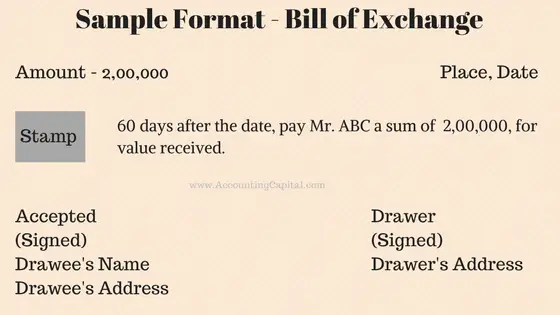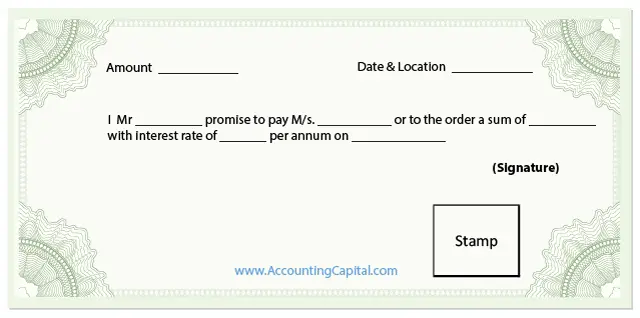Bill of Exchange Vs Promissory Note
To pay for credit sales a buyer may make a written promise in form of a promissory note or a bill of exchange. Below is a compilation of the major points of difference between a bill of exchange and a promissory note.
Definition (Bill of Exchange) – It is a financial instrument in writing containing an unconditional order signed by the maker, directing another person to pay a specific sum of money. It is paid to the bearer of the instrument (or) to the order of a particular person (or) to a particular person.
Format

Definition (Promissory Note) – It is a financial instrument, in which one party promises in writing to pay a pre-determined sum of money to the other party subject to agreed terms. It can either be payable on demand or at a specific time. It may be paid to the bearer of the instrument (or) to the authorized party (or) to the order of the authorized party.
Format

Difference (Table Format)
| Bill of Exchange | Promissory Note |
| 1. A bill of exchange is an order to pay. | 1. A promissory note is a promise to pay. |
| 2. The creditor is the drawer in this case. | 2. The debtor is the drawer in this case. |
| 3. There are 3 parties involved in a bill of exchange; the Drawer, the Drawee, and the Payee. | 3. There are 2 parties involved in a promissory note; Promisor and the Payee. |
| 4. Acceptance is mandatory by the drawee. | 4. Acceptance is not mandatory by the drawee. |
| 5. Liability of the drawer is only recognized when the acceptor fails to pay. | 5. Promisor has the primary liability to make a payment. |
| 6. Noting a bill of exchange is advisable in case of non-payment. | 6. Noting a promissory note is compulsory in case of non-payment. |
| 7. Stamping is necessary for a bill of exchange except for “bills payable on demand”. | 7. Stamping is necessary for promissory notes without any exceptions. |
| 8. A single copy is prepared, except in the case of foreign bills. (3 copies are made) | 8. One copy is prepared in all cases. |
>Read Bookkeeping Vs accounting
